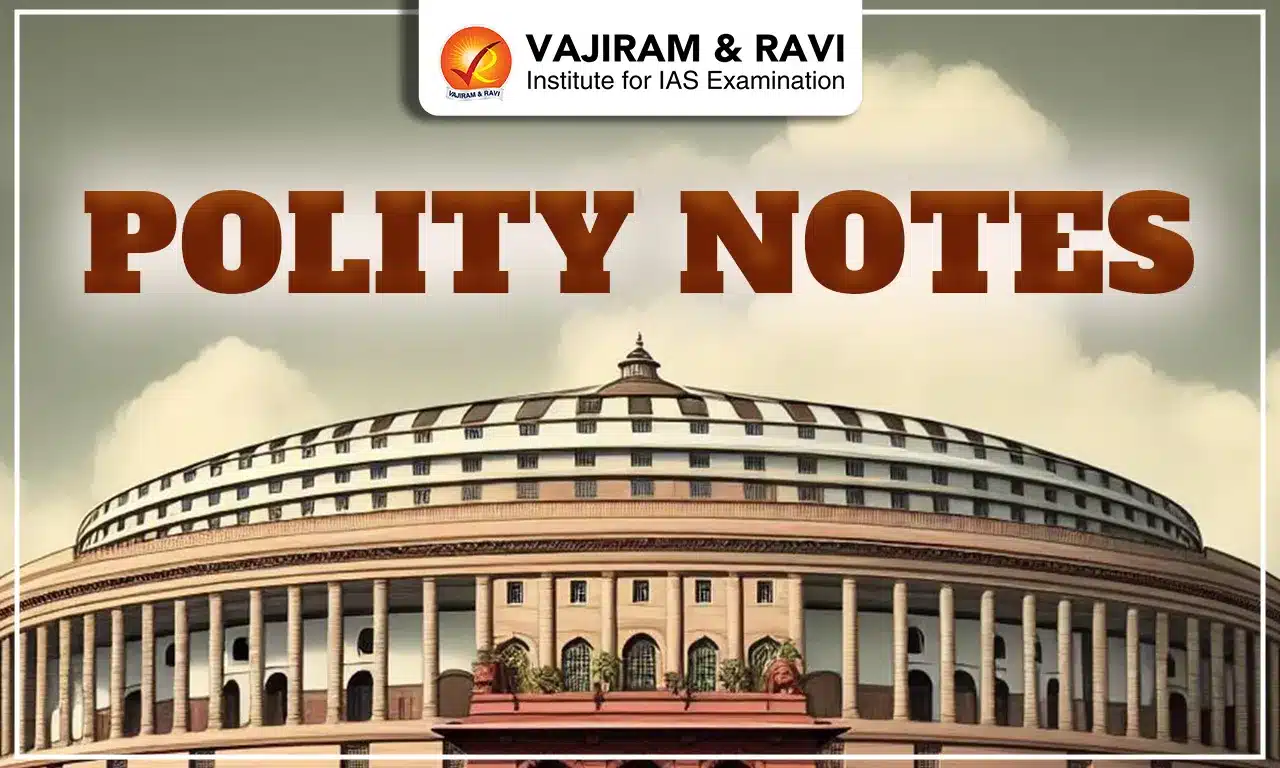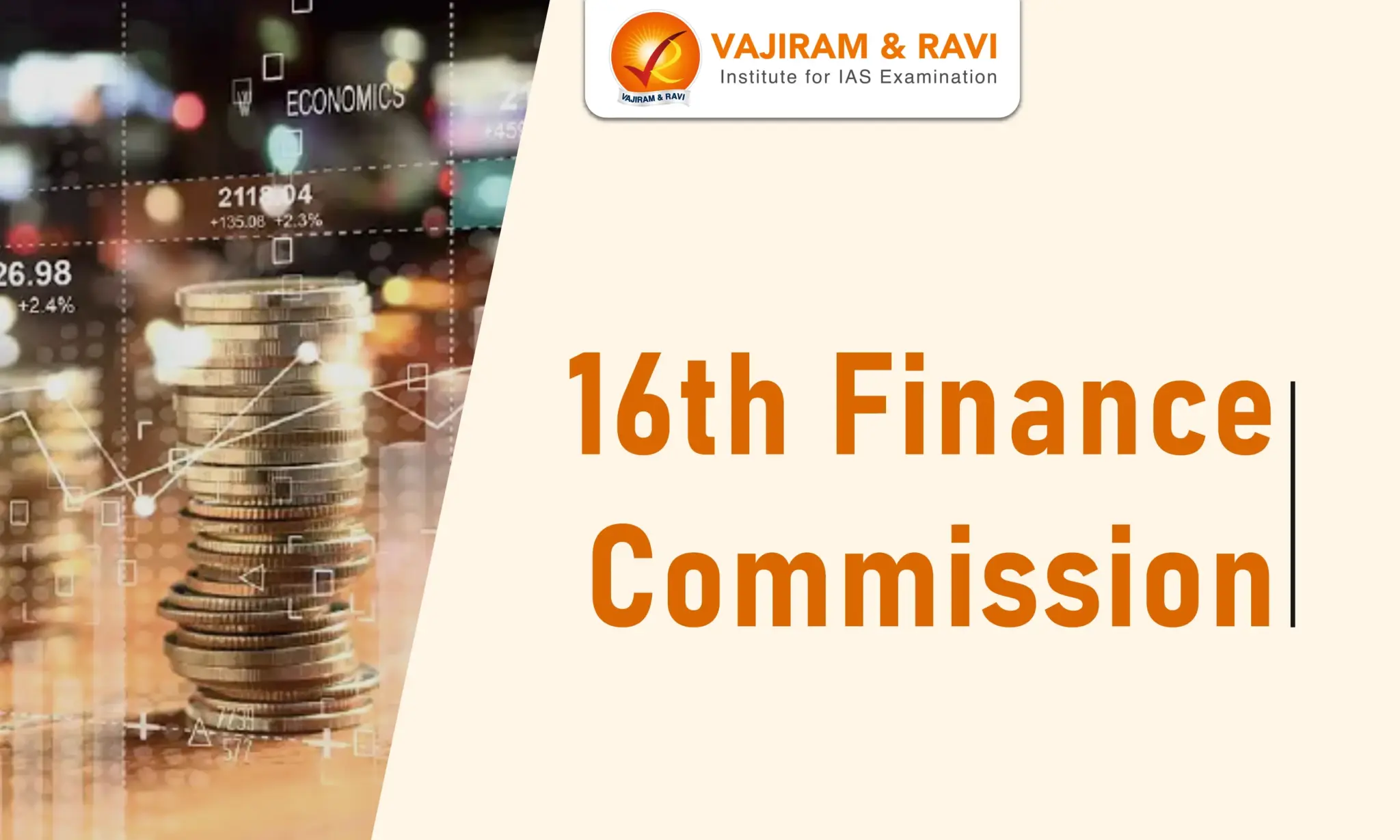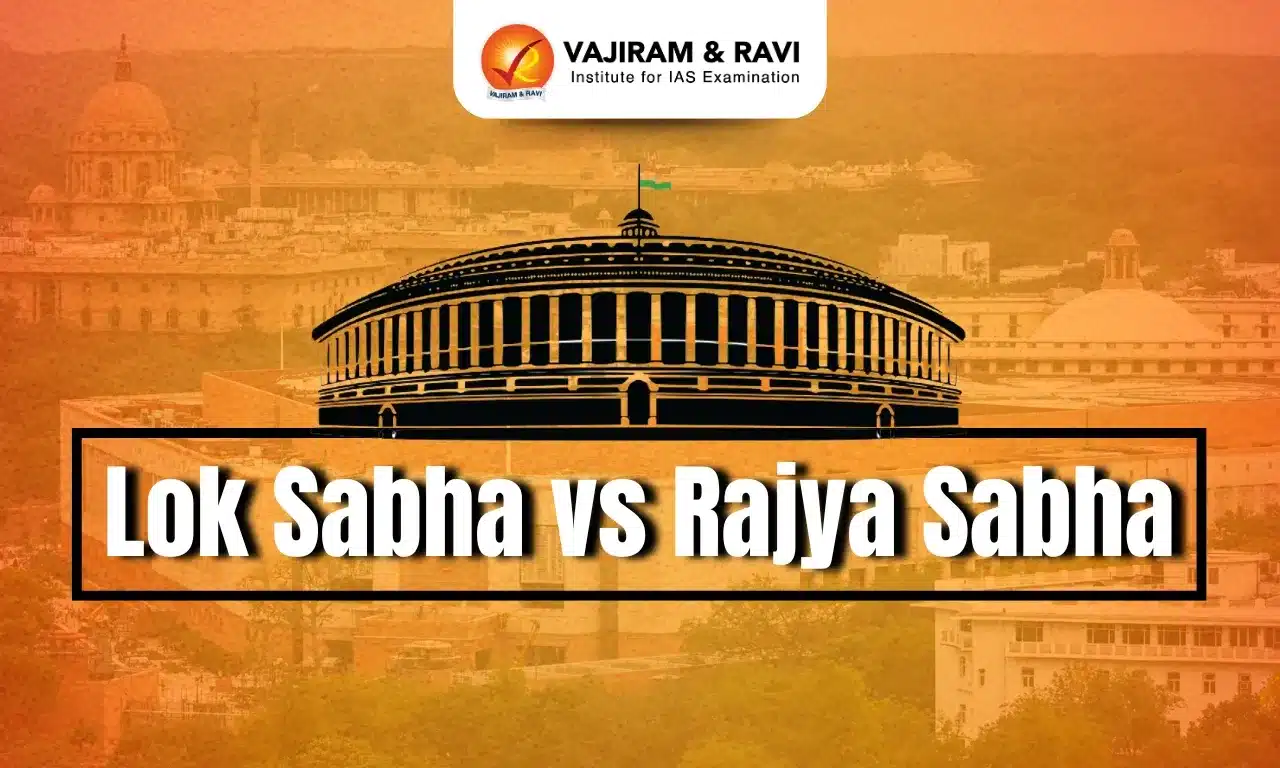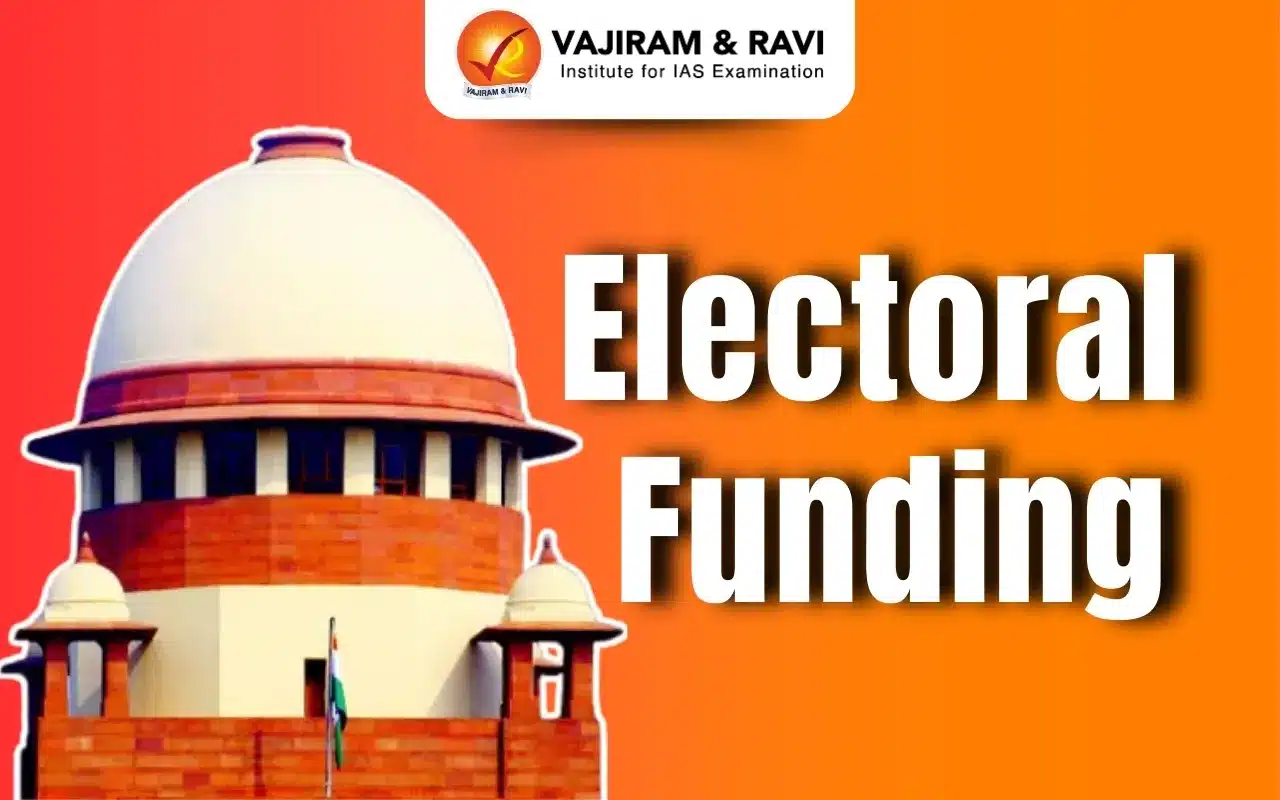Polity Notes for UPSC offer concise and organized notes of dynamic Indian politics, turning points, and the developments that have shaped the society. These notes are essential for UPSC aspirants as they form a major component of the General Studies Paper II in the UPSC Mains Exam 2026. These notes include the Indian Polity Concepts, Indian Constitution, Day-to-Day Indian Polity, helping in building a deeper understanding of Indian polity.
UPSC Polity Notes
Vajiram and Ravi have carefully prepared UPSC Polity Notes by the best faculty and subject experts which are specifically designed for UPSC aspirants. These notes offer in-depth study material for the Preamble, Fundamental Rights, Directive Principles of State Policy, and Fundamental Duties, as well as the three branches of government (Legislature, Executive, Judiciary) and the federal system in India. By studying these Polity Notes for UPSC, aspirants can gain valuable insights which involves changes made through amendments, significant court decisions, and shifts in society,
UPSC Polity
UPSC Polity plays a crucial role in UPSC CSE 2026, including the framework for its government, fundamental rights, and principles of governance. To help aspirants in the preparation we have provided UPSC Polity Notes to serve. These notes cover important topics and sub-topics, ensuring a well-rounded approach to the subject for the UPSC Exam 2026.
Indian Constitution
The Indian Constitution is the cornerstone of India’s democracy, embodying its rich history, diverse ethos, and legal framework. Explore the evolution of the Constitution, the pivotal role of the Constituent Assembly, its salient features, and the significance of constitutional amendments.
- Indian Constitution
- History and Evolution of the Indian Constitution
- Constituent Assembly - Objectives, Functions, Sessions and Members
- Salient Features of Indian Constitution
- Constitutional Amendment
- Important Amendments in Indian Constitution
- 42nd Constitutional Amendment Act 1976
- 44th Constitutional Amendment Act
- 73rd Constitutional Amendment Act
- 74th Constitutional Amendment Act
- 101 Constitutional Amendment Act
- 102 Constitutional Amendment Act
- 103 Constitutional Amendment Act
- 104 Constitutional Amendment Act
- 105 Constitutional Amendment Act
- History and Evolution of the Indian Constitution
Significant Provisions of Indian Constitution
The Significant Provisions of the Indian Constitution highlight the principles that uphold India’s democratic governance and legal integrity. Understand doctrines like Basic Structure, Separation of Powers, and Checks and Balances, alongside comparisons with global constitutions and electoral systems.
- Significant Provisions of Indian Constitution
- Basic Structure Doctrine
- Separation of Powers
- Doctrine of Checks and Balances
- Sources of Indian Constitution
- Comparison of Indian Constitution with Other Countries
- Comparison of India-UK Constitution
- Types of Majorities
- Constitutionalism
- Proportional Representation
- First Past the Post System
- C R Formula
Schedules of Indian Constitution
The schedules of the Indian Constitution provide detailed provisions for governance and administration. Key schedules include the 5th and 6th for tribal areas, the 7th for Union, State, and Concurrent lists, the 8th for official languages, and the 9th for laws exempt from judicial review. The 10th addresses anti-defection laws, while the Inner Line Permit ensures protection of indigenous rights.
- Schedules of Indian Constitution
- 5th Schedule - Fifth Schedule of Indian Constitution
- 6th Schedule - Sixth Schedule of Indian Constitution
- Inner Line Permit
- Seventh Schedule of Indian Constitution - Union, State and Concurrent List
- 8th Schedule - Eighth Schedule languages
- 9th Schedule - Ninth Schedule of Indian Constitution
- Anti-defection Law - Tenth Schedule
The Preamble of Indian Constitution
The Preamble embodies the Constitution's core values, emphasizing justice, liberty, equality, and fraternity. It sets the foundation for India's democracy, governed by a Parliamentary system. Understand its distinctions from the Presidential form of government and their respective features and structures.
- The Preamble of Indian Constitution
- Democracy
- Parliamentary Form of Government
- Presidential Form of Government
- Difference between Parliamentary and Presidential Form of Government
- Democracy
Union and its Territory
India's territorial organization is defined by its Constitution, encompassing states and union territories. Key milestones include the State Reorganisation Act of 1956, which reorganized states based on linguistic lines, and the Jammu and Kashmir Reorganisation Act of 2019, redefining its status. Explore the administrative significance of union territories and their unique governance.
- Union and its Territory
- State Reorganisation Act 1956
- Jammu and Kashmir Reorganisation Act 2019
- Union Territories of India
Citizenship
Citizenship in India is governed by the Constitution and the Citizenship Act of 1955, detailing acquisition, termination, and related provisions. Recent developments, including the Citizenship Amendment Act of 2019, the National Register of Citizens (NRC), and the National Population Register (NPR), highlight evolving dynamics in determining citizenship and inclusion.
- Citizenship
- Citizenship Act 1955
- Citizenship Amendment Act 2019
- National Register of Citizens
- National Population Register
- Citizenship Act 1955
Fundamental Rights
Fundamental Rights ensure equality, freedom, and justice, covering human rights, privacy, and cultural protections. Landmark provisions like Articles 12, 19, and 21 address issues like religious freedom, reservations, and anti-conversion laws, upholding constitutional morality and inclusivity.
- Fundamental Rights
- Rights
- Human Rights
- Natural Rights
- Article 12 - Definition of State
- Article 13 of Indian Constitution
- Right to Equality
- Rule of Law
- Reservation in India
- Women Reservation Bill
- Women in Politics
- Presidential Awards - Bharat Ratna and Padma Awards
- Mandal Commission
- Right to Freedom
- Article 19
- Right to Information
- Article 21
- Right to Privacy
- Freedom of Press
- Right to be Forgotten
- Principle of Natural Justice
- Due Process of Law
- Procedure Established by Law
- Right Against Exploitation
- Right to Freedom of Religion
- Sabarimala Case
- Anti Conversion Law
- Hijab Issue
- Cultural and Educational Rights
- Anti Conversion Law
- Constitutional Morality
- Writs - Types of Writs in Indian Constitution
- Mandamus
- Right to Property
- Rights
Directive Principles of State Policy
The Directive Principles aim to establish socio-economic justice, complementing Fundamental Rights. They guide policies like the Uniform Civil Code and reform personal laws, fostering equality and bridging gaps between individual freedoms and state welfare priorities.
- Directive Principles of State Policy
- Fundamental Rights vs DPSP
- Uniform Civil Code
- Personal Laws in India
Fundamental Duties
Fundamental Duties, enshrined in Article 51A, emphasize civic responsibility, including respect for the Constitution, national symbols, and environmental protection. Unlike Fundamental Rights, which are enforceable claims, duties guide citizens in upholding democratic principles and fostering national harmony.
- Fundamental Duties
- Difference between Fundamental Rights and Fundamental Duties
Union Executive
The Union Executive comprises the President, Vice President, Prime Minister, Council of Ministers, and Cabinet Committees. The President holds ordinance-making powers and pardoning authority under Article 72, while the Prime Minister leads governance alongside the Council of Ministers.
- Union Executive
- President of India
- Powers of President of India
- Ordinance Making power of President
- Pardoning Powers of the President - Article 72
- Vice President of India
- Prime Minister
- Council of Ministers
- Cabinet and Cabinet Committees - Cabinet Ministers of India
- President of India
Federalism
Indian federalism emphasizes a strong center while promoting state autonomy. Explore cooperative, competitive, and asymmetric federalism, Article 371 provisions, center-state relations, fiscal federalism, GST Council, and recommendations of the Sarkaria and Punchhi Commissions to strengthen federal governance.
- Federalism
- Cooperative Federalism
- Competitive Federalism
- Asymmetric Federalism
- Article 371
- Centre State Relations
- Sarkaria Commission
- Punchhi Commission
- Inter State Relations
- Inter State Council
- Fiscal Federalism
- Goods and Services Tax
- GST Council
Emergency Provisions
The Indian Constitution provides for emergencies to address crises effectively: National Emergency (Article 352), President's Rule in states (Article 356), and Financial Emergency (Article 360). These provisions ensure stability while maintaining constitutional checks and balances.
- Emergency Provisions
- National Emergency
- President's Rule - Article 356
- Financial Emergency
Parliament of India
The Indian Parliament, comprising the Lok Sabha and Rajya Sabha, performs lawmaking, budget approval, and oversight. Key aspects include majority types, the law-making process, money and finance bills, parliamentary privileges, committees, motions, and the role of the Leader of Opposition.
- Parliament of India
- Functions of Parliament
- Types of Majority
- Sessions of Parliament
- Law Making Process in India - How a bill is passed in Indian Parliament
- Money Bill
- Leader of Opposition
- Finance Bill - Article 117
- Speaker of Lok Sabha
- Office of Profit
- Parliamentary Commitees
- Ethics Committee
- Parliamentary Privileges - Article 105
- Motions in Parliament
- No Confidence Motion
- Functions of Parliament
Union Budget - Government Budgeting
The Union Budget outlines India's annual financial plan, detailing revenue and expenditure priorities. The 2024-25 budget emphasized housing and urban development, while the 2025-26 budget anticipates measures for economic growth and industry reforms.
- Union Budget - Government Budgeting
- Union Budget 2024
- Union Budget 2025
State Executive
The State Executive comprises the Governor, Chief Minister, Council of Ministers, and Advocate General. The Governor represents the state, while the Chief Minister and ministers oversee governance. The Advocate General advises on legal matters.
- State Executive
- Governor
- Chief Minister and Council of Ministers
- Advocate General of State
State Legislature
The State Legislature comprises the Legislative Assembly and, in some states, the Legislative Council. It enacts laws, oversees governance, and addresses state issues. The Legislative Council, where present, functions as the upper house with a review role.
- State Legislature
- State Legislative Council
Indian Judiciary
The Indian Judiciary ensures justice through its independent structure. Key elements include the Supreme Court's jurisdiction, the High Courts, and subordinate courts. Explore concepts like judicial activism, PILs, pendency issues, reforms, and the balance between activism and overreach.
- Indian Judiciary
- Judicial Independence
- Collegium System - NJAC
- Supreme Court
- Jurisdiction of Supreme Court
- High Court
- Subordinate Courts
- Judicial Activism
- Judicial Overreach
- Judicial Reforms in India
- Public Interest Litigation (PIL)
- Judicial Pendency
- Contempt of Court
Tribunals
Tribunals address specific disputes efficiently, bypassing conventional courts. Administrative Tribunals like the Central Administrative Tribunal (CAT) handle service-related matters, while the National Green Tribunal (NGT) resolves environmental issues under the NGT Act, ensuring swift and specialized adjudication.
- Tribunals
- Administrative Tribunals
- National Green Tribunal - NGT Act
- Central Administrative Tribunal - CAT
Local Government in India
Local governments, comprising Panchayati Raj Institutions (PRIs) and Urban Local Bodies, empower grassroots administration. Key elements include the Gram Sabha, PESA Act for tribal areas, and the devolution of power and finances, fostering inclusive and participatory governance.
- Local Government in India
- Panchayati Raj System - PRIs in India
- Gram Sabha
- Urban Local Bodies
- PESA Act
- Devolution of Power and Finances
- Panchayati Raj System - PRIs in India
Election
Elections in India are overseen by the Election Commission of India (ECI) and guided by the Representation of People Acts (1950 and 1951). Key issues include electoral funding, voting behavior, criminalization of politics, reforms, and the "One Nation, One Election" proposal.
- Election
- Election Commission of India - ECI
- Political Parties in India
- Electoral Funding
- Model Code of Conduct
- Representation of Peoples Act 1950
- Representation of Peoples Act 1951
- Voting in India - Voting Behaviour
- Criminalisation of Politics
- Electoral Reforms in India
- One Nation One Election
- State Election Commission
Constitutional Bodies
Constitutional bodies like the Finance Commission (14th to 16th), CAG, and Attorney General uphold fiscal and legal integrity. NCSC, NCST, and NCBC ensure representation for marginalized communities, while the Special Officer for Linguistic Minorities safeguards linguistic diversity.
- Constitutional Bodies
- Finance Commission
- 15th Finance Commission
- 16th Finance Commission
- 14th Finance Commission
- CAG -
- NCSC
- NCST
- NCBC
- Attorney General of India
- Special Officer for Linguistic Minorities
- Finance Commission
Statutory, Quasi-judicial and Non Constitutional Bodies
Constitutional bodies like the Finance Commission (14th to 16th), CAG, and Attorney General uphold fiscal and legal integrity. NCSC, NCST, and NCBC ensure representation for marginalized communities, while the Special Officer for Linguistic Minorities safeguards linguistic diversity.
- Statutory, Quasi-judicial and Non Constitutional Bodies
- Central Bureau of Investigation
- Lokpal and Lokayukta - Lokpal and Lokayukta Act 2013
- NHRC - National Human Rights Commission
- State Human Rights Commission
- Universal Declaration of Human Rights - UDHR
- National Commission for Women
- NCPCR - National Commission for Protection of Child Rights
- National Commission for Minorities
- Central Vigilance Commission - CVC
- Central Information Commission
- State Information Commission
- National Council for Transgender Persons
- NITI Aayog
- Competition Commission of India (CCI) - Competition Act 2009
- Press Council of India
Regulatory Bodies in India
Regulatory bodies like TRAI manage telecom policies, the Airport Authority of India oversees aviation infrastructure, and FSSAI ensures food safety. These entities establish guidelines, enforce compliance, and maintain quality standards across various sectors.
- Regulatory Bodies in India
- Telecom Regulatory Authority of India TRAI
- Airport Authority of India
- FSSAI
Pressure Group
Pressure groups, comprising formal and informal associations, influence policy decisions without seeking political power. These organizations advocate for specific interests, shaping governance and public policies through lobbying, activism, and representation of diverse societal concerns.
- Pressure Group
- Formal and Informal Associations
Importance Supreme Court Judgements in India
Key rulings like Kesavananda Bharati's Basic Structure Doctrine, Golaknath on Fundamental Rights, Indra Sawhney on reservations, and Article 370's status transformation have profoundly impacted India's constitutional interpretation and governance dynamics.
- Importance Supreme Court Judgements in India
- Berubari Union case
- Golaknath case
- Kesavananda Bharati case
- ADM Jabalpur Case
- Indra Sawhney Case
- IR Coelho
- Article 370
Recent Bills Passed in Parliament
Parliament passed significant bills in 2024, including the Waqf (Amendment) Bill enhancing waqf property management, amendments to Scheduled Castes and Tribes Orders, the Water Pollution Bill, and measures boosting social justice and economic reforms.
- Recent Bills Passed in Parliament
- Waqf Amendment Bill 2024
Last updated on March, 2026
→ UPSC Notification 2026 is now out on the official website at upsconline.nic.in.
→ UPSC IFoS Notification 2026 is now out on the official website at upsconline.nic.in.
→ UPSC Calendar 2026 has been released.
→ UPSC Final Result 2025 is expected to be released soon.
→ Check out the latest UPSC Syllabus 2026 here.
→ Join Vajiram & Ravi’s Interview Guidance Programme for expert help to crack your final UPSC stage.
→ UPSC Mains Result 2025 is now out.
→ UPSC Prelims 2026 will be conducted on 24th May, 2026 & UPSC Mains 2026 will be conducted on 21st August 2026.
→ The UPSC Selection Process is of 3 stages-Prelims, Mains and Interview.
→ Prepare effectively with Vajiram & Ravi’s UPSC Prelims Test Series 2026 featuring full-length mock tests, detailed solutions, and performance analysis.
→ Enroll in Vajiram & Ravi’s UPSC Mains Test Series 2026 for structured answer writing practice, expert evaluation, and exam-oriented feedback.
→ Join Vajiram & Ravi’s Best UPSC Mentorship Program for personalized guidance, strategy planning, and one-to-one support from experienced mentors.
→ Check UPSC Marksheet 2024 Here.
→ UPSC Toppers List 2024 is released now. Shakti Dubey is UPSC AIR 1 2024 Topper.
→ Also check Best UPSC Coaching in India
UPSC Polity Notes FAQs
Q1. Is polity easy for UPSC?+
Q2. Is NCERT needed for UPSC polity?+
Q3. Is Laxmikant enough for UPSC mains?+
Q4. Which is the hardest subject for UPSC?+














